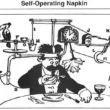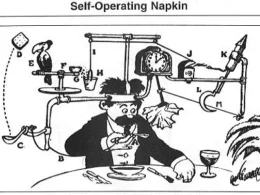When announcing that Chrysler would be reorganizing under Chapter 11 today, President Obama went out of his way to highlight the role un-named hedge funds played in pushing the auto-maker to bankruptcy.
“In particular, a group of investment firms and hedge funds decided to hold out for the prospect of an unjustified taxpayer-funded bailout…They were hoping that everybody else would make sacrifices and they would have to make none…Some demanded twice the return that other lenders were getting.”
This is a very good sign that the Executive Branch is aware of the high cost of unregulated greed.








Actually, it is not a good sign. It is horrible that the President of the United States called out Hedge Funds and “speculators”. Hedgefunds and “speculators” provide liquidity, and are good for the overall capital markets – on paper.
As it is, it’s like Old Yeller. What was created to do good, to bring benefit, gets diseased to the point where it must be put down.
Wall St., regardless of an what an obviously incredulous CNBC thinks, deserves the worst of all possible fates. The nation’s economy is nothing but a corpse; why allow them to go through the pockets for loose change?
What is truly rich, however, is the hedgefund community and Wall st. supported Obama. I think they are incredulous that somebody actually did what he said he would do, i.e, didn’t lie. That is rare on Wall St.
Given a choice, I think most of us would choose to suffer, rather than see Wall St. have any success at all. As a matter of fact, we are suffering, and they have no success.
Shorting makes liquidity. I say a buyer makes liquidity.
If there were no buyers, you would not be able to sell or sell short!.
There would be no market.
It takes buyers and sellers to make the market.
Shorts along with market makers not following the law manipulate the market.
basic short argument is:
No one is selling so no one can buy.
So shorts , out of the goodness of their heart, borrow a stock and sell the stock to make a market.
I thought this was the job of the Market Maker and the 3 day rule to help the Market Maker.
This liquidity the short “brings “ into the market is really to his advantage.
What does a naked short need to accomplish his goals?
INCREASE selling of a stock. (wow, he can help his own cause)
The stock owner does not know it has happened.
Not returning a stock within 3 days.
Market Makers complacency, deal making or greed.
Advance negative information
Rumors
Anything negative.
When you naked sell a stock, you do so because you think it will go lower.
you have information that few others have and you want to take advantage of that.
The 3 days rule takes place: but tough for the information to get out in 3 days to affect the stock.
So I think a naked shorter has to have working terms with a Market Maker(s) to accomplish him taking advantage of his information.
Lets assume the information gets out in 3 days. Do you think there will be sellers now?
Did we really need naked shorts to create liquidity?
Lets see a naked short, out of the goodness of his heart, buy a stock to make a market when there are only sellers. No buyers, no market period!
The truth is: The “owner of the stock” did not know it happened!
Who would loan their car to an unknown person if they knew their car would be devalued when returned? Try this with any car rental!
With stock, the owner has voting rights and a record that he owns the stock.
With naked short you end up with more then 100% ownership.
Only a problem when you have big investors who can vote in a block, otherwise you never see it.
The “lender” (Market Maker) of a stock makes money by buying and selling.
The greed of a Market Maker lends to the problem. The MM does nothing when the short overextends.
Let me not pay my stock bill on time and see what happens to me.
How timely, action happens to anyone who has had a margin account go sour.
All stock buys/sells should be halted for the person that does not return any stock within the 3 day period. PERIOD! And appropriate action against the Market Maker and especially the Broker who bends the rules for large clients but not small clients.
Terrible POST!!!
Good Sign? Amazing you think this. Obama has been throwing good money into this beast for far too long. This company should have been in bankruptcy a long time ago. Let’s thank anyone who forced this to happen now instead of letting the big O prolong this. Let’s see all parties involved take equal cuts.
I was speaking of “calling out” Wall St. ” This is my second Chrysler bankruptcy, and I’ll probably live to see a third. Nothing I can do about it. But putting Wall St. on notice tells me he’s going to neuter them. That is a good thing. Left to themselves, we’ll all be living in tents.
Take a nice long look at the number 2 donor on the link I’ve included here:
http://www.opensecrets.org/pres08/contrib.php?cycle=2008&cid=N00009638
How angry is Obama going to get, really?
I’m a simple ol’ boy, but isn’t Wallstreet and the banking system about measuring and keeping the wealth the rest of us created for safekeeping?
Shouldn’t the productive economy lead the accountants rather than the other way around? How is it that trouble with MEASURING and STORING stops the economy from PRODUCING?
Wallstreet should be beholden to mainstreet, not the other way around. Why should the people that build and manufacture things or produce services stopped from building and manufacturing and providing services just because Wallstreet doesn’t know how to count?
It will be interesting to see where the administration comes out on Cerberus.
It was reported today that the Chrysler finance will be absorbed by GMAC and the government, (presumably the treasury as opposed to the Fed) would be proviging financial support. Cerberus had purchased a controling interest in GMAC in 2006.
The Deep Capture team reported several months ago that they would have some insight to share about the fate of companies under the influence of Cerberus. I would be quite interested he hear more of deep Capture’s perspective on this today.
My understanding would suggest Feinberg likes to control reorganizations/and extinguishing equity via large unsecured stakes. Man short biased funds report long equity stakes when in act the net equity position is far smaller.
I find Cerberus will usually use their influence to secure retention of the usual suspects like Weil and Alix Partners who provide favorable financials and drive the Court process and extinguish common sharteholders. Cerberus most often will emerge as controling stakeholder through debt for equity exchange. Cerberus also had former Executive Brancher, Dan “Potatoe Head” Quayle, on the payroll.
Funny I hear all the usual rancor about President Obama and his shortcomings by some here but I never once heard any of you bash Bush for his tolerance of such and bringing in his allstars Chris Cox (and Hank Paulson) to run this country into financial ruin. I am suprised that some of you are not blaming our current President and his Administration for the Chrysler Bankruptcy. Well here is the truth of the matter,(more than Bush ever did) he put the hedge Funds on notice today and no matter how much you don’t like the fact ..he is in office and he will be there for 4 years. GET OVER IT!!!
p.s. Who spent, stole and wasted more money than Bush and Paulson?? You guys are too funny!!
The SEC hard at work protecting us from these “Big time” Crooks!!LOL Are they still investigating the person(s) that places the $1.5million put option against bear Stearns that netted 250million in 2 weeks? What about going after the real big fish and get these tadpoles later. How many more Madoffs and Stanfords are these guys overlooking intentionally while prosecuting these little people? I wonder…
SEC Charges Wall Street Investment Banker & others
« Thread Started Today at 6:39pm »
——————————————————————————–
SEC Charges Wall Street Investment Banker and Seven Others in Widespread Insider Trading Scheme
FOR IMMEDIATE RELEASE
2009-99
Washington, D.C., April 30, 2009 — The Securities and Exchange Commission today charged a former Citigroup investment banker for repeatedly tipping his brother about upcoming merger deals in an insider trading scheme that involved friends and family throughout Northern California and the Midwest and reaped more than $6 million in illicit profits.
Chart: Tracking the Scheme
Full-size (PDF) The SEC alleges that Maher Kara, a former director in Citigroup Global Markets’ investment banking division in New York, repeatedly told his brother Michael Kara of Walnut Creek, Calif., about upcoming deals involving Citigroup’s health care industry clients. The SEC further alleges that Michael Kara, in addition to buying stock and options in target companies that were the subject of the Citigroup deals, leaked the information to a network of friends and family who also traded in advance of the deals. The SEC has charged the Kara brothers and six others in the case.
“Insider trading exposes publicly-traded companies and their shareholders to serious harm, and damages the integrity of the markets,” said Robert Khuzami, Director of the SEC’s Division of Enforcement. “In this case, an investment bank professional violated the trust of his employer and the clients who relied on the bank’s confidential advice.”
Marc J. f*gel, Director of the SEC’s San Francisco Regional Office, added, “We are charging not only the person who stole the information from his employer, but also those who received and then traded on that information. These individuals netted millions of dollars in illegal windfall profits by trading on confidential information they knew was obtained improperly.”
According to the SEC’s complaint, filed in federal district court in San Francisco, Michael Kara is a self-employed environmental clean-up consultant who traded in at least 20 companies that were involved in confidential transactions pending in the Citigroup health care investment banking group where Maher Kara worked. In many cases, Michael Kara also tipped friends and family members in California and Illinois.
The participants in the scheme made their biggest profits trading in the stock and options of San Diego, Calif.-based medical testing company Biosite, Inc., less than three days before a March 25, 2007, announcement that it would be acquired. According to the SEC’s complaint, Maher Kara tipped his brother on March 22 about the confidential merger negotiations, and less than 15 minutes later Michael Kara began acquiring a large volume of Biosite stock and short-term call options. That same day, Michael Kara began calling friends and family members to pass along the tip, and they too began buying Biosite securities. After the acquisition of Biosite was publicly disclosed days later, the stock price jumped over 50 percent. Michael Kara made illegal profits of more than $1.2 million, while his six tippees together made nearly $4 million.
——————————————————————————–
Additional Materials
Litigation Release No. 21020
SEC Complaint v. Maher F. Kara et al.
SEC Complaint v. Joseph Azar
SEC Complaint v. Nasser Mardini
——————————————————————————–
In addition to the Kara brothers, the SEC also charged:
Emile Jilwan of Pleasanton, Calif. (Michael Kara’s friend), who made $2.3 million on Biosite trades.
Zahi Haddad of Stockton, Calif. (Michael and Maher Kara’s uncle), who made $82,000.
Bassam Salman of Orland Park, Ill. (brother of Maher Kara’s wife), who passed the information to his brother-in-law.
Karim Bayyouk of Livonia, Mich. (Salman’s brother-in-law), who made $950,000 (some of which he returned to Salman).
Joseph Azar of Pleasanton, Calif. (Michael Kara’s friend), who made $118,000.
Nasser Mardini of Stockton, Calif. (Michael Kara’s friend), who traded in others’ accounts and tipped another person for profits of $291,000.
The SEC’s complaint alleges that Maher Kara, who is now residing in San Carlos, Calif., also tipped his brother about a planned March 2006 acquisition of Andrx Corporation, a Florida drug manufacturer. Michael Kara allegedly made nearly $400,000 in illegal profits trading on the tip, and passed the information to Jilwan, Haddad, Azar, and Salman (who then tipped Bayyouk). Together, they made an additional $750,000 when the Andrx acquisition was announced.
In a parallel criminal action, the U.S. Attorney’s Office for the Northern District of California and the Federal Bureau of Investigation today announced the criminal indictment of Maher Kara, Michael Kara, and Emile Jilwan.
Two of Michael Kara’s tippees, Nasser Mardini and Joseph Azar, have agreed to settle the SEC’s charges without admitting or denying the allegations. Mardini has agreed to repay illegal profits, and Azar has agreed to repay illegal profits and pay a penalty. In its non-settled enforcement action against the remaining defendants, the SEC seeks disgorgement of illegal profits, financial penalties, and other relief.
The SEC acknowledges the assistance of the Chicago Board Options Exchange, the Federal Bureau of Investigation, and the U.S. Attorney’s Office for the Northern District of California in this matter. The SEC also acknowledges the assistance provided by Citigroup during the investigation.
# # #
For more information, contact:
Marc J. f*gel
Regional Director, SEC’s San Francisco Regional Office
(415) 705-2449
Michael S. Dicke
Associate Regional Director, SEC’s San Francisco Regional Office
(415) 705-2458
# # #
http://www.sec.gov/news/press/2009/2009-99.htm
i think its a sign that obama is a d-bag and his administration doesnt have a clue
The statement was too vague to really tell us the direction Obama wants to head. If it was just proganda aimed at invoking wealth envy, then it is nothing.
If it was simply a set up to lay the failures of Washington on the steps of Wall Street; then it was nothing.
It only means something if Obama actually sees FTDs as a primary cause of the economic problems.
The really important thing to remember in this debate is that the primary justification for short selling is that it is supposed to somehow regulate the markets. Obama’s anger may be aimed only at independent investors who are not subserviant to the political machine.
I actually wrote off that particular statement as a partisan piece of nothing and would want a more specific statement before making any guesses about the direction of the administration.
OT: I only post this as it is based on a peer reviewed article in a chemistry journal based on chemical residues that were proven to be present.
You can’t understand naked shorting and failure to deliver without understanding money laundering and the destruction of the PRIMARY and BACKUP systems for most of Wallstreet and the SEC. Think about it, whatever you want to think about 911, it happened in the two buildings that had the most to do with naked shorting and those records and their backups were destroyed.
If nothing else, you can’t understand the stock market without understanding what the rest of the world thinks of us.
http://revolutionarypolitics.com/?p=453
I look at these thieves like a parasite or disease. Parasites can be hard to get rid of. Athlete’s foot can persist for years until it gets annoying enough that the host gets the right chemicals to irradicate it.
I see the same thing here. The thieves have little power except we’ve ignored them. Now that we know they are here, we need to deal with them and irradicate them from our economy.
You bring up a good point, willful. I think Cerberus has some secured chrysler debt but i still don’t see how they cannot be taking a bath on Chrysler… I think any of the equity holders would be lucky to get a nickel out of a restructuring. So what’s their standard MO at the companies they’ve bought out? I too would be very interested in reading a follow up piece on cerberus by Mark.
Obama is the real deal and once again is so right on… I hope as time goes on he gets around to purging his administration of any crooked DLC holdovers…
Congress is pointing the finger at Wall Street , they are shifting the blame just like they did with the AIG bonuses , its a good time to push for hearings on NSS … contact Barney Frank
http://www.investorvillage.com/smbd.asp?mb=971&mn=270442&pt=msg&mid=7165697
For the record, I voted for Obama, and continue to support him in general.
But the facts speak for themselves.
Goldman (with Soros and some other unsavories) have the gov’ts, past, present and future, well in pocket.
This is unfortunate and apolitical.
I don’t expect any major changes – witness the flaccid ‘efforts’ of the SEC to date vis-a-vis the whole shortselling (naked in particular) issue.
All we can do is continue to document the abuses here on this site and any others and opine to our ‘representatives’ in ‘government’.
Could this just be a warm-up act to the GM Show in June? The math on the Fed offer (FED = 50% equity for $20B bail, Bondholders = 10% equity for $27B notes, UAW = 40% for $10B pension) seems designed to fail. Quacks like a duck, it does.
if he said ONE THING about investigating hedge fund crimes, i would be happy about obama’s anger. as of right now, it’s lip service. getting angry at hedge funds now is like owning a iphone. obama is politically aware enough to know this and knows that all he has to do is get in front of the press and say, “by golly, i’m so darn angry at these hedge funds with all their money!” the nice thing about saying it is that it makes everybody believe he’s on their side without requiring a single meaningful action on obama’s part.
http://www.nytimes.com/2009/05/01/business/economy/01norris.html?_r=1
http://www.rgemonitor.com/globalmacro-monitor/256591/where_is_superman__is_he_deep_captured
Below is Flim-flam Floyd’s blog entry to cover his ass for the original “Goodbye to Naked Shorting” story cited above. Notice the much less definitive headline. Norris is only a notch above Nocera on the credibility level.
April 30, 2009, 10:39 PM
Is Naked Shorting Gone?
In my Friday column, I report on data that seems to indicate the S.E.C. has solved the naked shorting problem. That data indicates that the number of failed stock trades — in which shares are not delivered on time — is way down.
That column reports that Patrick Byrne, the chairman of Overstock.com, suggested a number of ways that failures could be hidden by Wall Street. But I did not offer detail on those views.
For anyone interested, here is the relevant e-mail exchange:
Mr. Byrne:
I notice that Overstock.com has not been on the Reg SHO list for some time, and that few stocks are on it now. Does that mean the rules have worked, or what other comments would you make?
Floyd Norris
Dear Mr. Norris,
Thank you for asking. As you may know, I have never primarily considered this fight to be about Overstock: it has been a fight to curtail illegal-but-winked at stock manipulation in our marketplace before more companies were destroyed and our marketplace destabilized. I always felt the insistence by some that my fight was about Overstock was part of a cover-up, and so I commend you for asking regarding the greater picture.
If I learned that the percentage of HIV-infection in the public blood supply had dropped, it would give me cheer, but I would not say, “This level of HIV infected blood has reached an acceptable level.” Similarly, seeing this drop in the number of firms on the Reg SHO list and the number of failed shares brings me cheer, but does not make me think the game is won. In particular, until we have data on failures in the other nooks and crannies of the system (broker-level netting, pre-netting, Stock Borrow Program, ex-clearing and off-shore failures) I cannot celebrate victory. However, yes I do think that the rule changes put in place during the latter part of last year made stock manipulation harder, and people have to be more sophisticated to do it.
Ultimately, what has to happen is that we go to requirements for pre-borrow and hard-delivery. That is what it will take to really end things. Incidentally, that is where the discourse was some months ago when it log-jammed within the SEC: on one side, the good guys arguing for pre-borrow and hard-delivery; on the other side, SIFMA and the Managed Funds Association arguing against them (on the grounds that if they were forced to stop doing that thing they have all along sworn they were not doing, it would dramatically affect liquidity). I believe (and have a source from within the SEC who tells me) that the current debate over the uptick rule was largely manufactured to shift the discourse. It is a red herring.
Respectfully,
Patrick Byrne
Thank you for your prompt reply.
Is there evidence available on the scale of the “failures in the other nooks and crannies of the system (broker-level netting, pre-netting, Stock Borrow Program, ex-clearing and off-shore failures)” that you refer to? Netting sounds as if it removes the possibility of manipulation. Is there a reason to think otherwise?
Floyd Norris
Dear Floyd,
First, just to make sure you know what I am talking about, I am sending you this section from an essay I wrote last August 3rd:
Let us look at where these unsettled trades can reside within the piping of the “factory” that is our nation’s stock settlement system, The Depository Trust & Clearing Company (“DTCC”). I will use Goldman and Morgan as hypothetical examples only.
“Desked trades” – Imagine Goldman takes your order for 1,000 shares of stock, but stashes your order in a desk and sends you statements saying that you have those 1,000 shares in your account (and use your money towards the $10 billion they pay themselves at the end of the year for being so clever). They have written a CDF to you without your knowledge: there is a 1,000 share failure-to-deliver to you at Goldman (which no one else knows about, incidentally).
“Pre-netting” – Goldman has one client sell 5,000 shares and another buys 3,000. The seller never delivers. Goldman “pre-nets” the trades before submitting them to the DTCC. Hence, the DTCC sees only 2,000 shares of the failure.
“CNS netting” – Goldman submits to the DTCC’s Continuous Net Settlement system that it sold 2,000 shares that it does not deliver. Imagine Morgan Stanley was on the other side of that particular trade. But maybe Morgan has a client who sold 1,000 to a Goldman client, and which that Morgan client failed-to-deliver. The DTCC nets the two trades, and therefore sees just 1,000 shares of failure (Goldman to Morgan).
“Stock Borrow Program” (“SBP”) – The DTCC looks at that 1,000 share failure, and says, “We have 400 shares we can loan Goldman from our Stock Borrow Program”, i.e., from the accounts of other BD’s within the DTCC. That reduces the failures it sees to 600.
“Ex-clearing” – Suppose Goldman and Morgan apply to the DTCC to move 500 of those fails ex-clearing, and the DTCC approves. Those 500 FTD’s are turned into a derivative contract between Goldman and Morgan. As a private contract, it is not regulated by the SEC, and the DTCC does not even know when that contract gets cleaned up, if ever.
“Offshore Failures” – Suppose someone sells 1,000 shares into this market from a foreign offshore exchange? There is a different terminology to describe such failures, and therefore the data is hard to get to. What is clear, however, is that there is little pressure to clean up failures among exchanges.
In this example, there are 100 failures at the CNS level. Yet there were 7,000 failures throughout the system. Therefore, we should remember that, however many unsettled equity trades there are at the CNS level, it is likely to be a fraction, and maybe a quite tiny fraction, of the total unsettled trades in the system.
What is the ratio of total fails in the system to those trapped in the CNS system? No one seems to know (and in fact, while the individual pieces of data are known individually, I strongly suspect that no one party has the bird’s eye view of how many of these there are at all levels). The estimates I am told range from 3 to 15. For ease I will refer to this as, “The Iceberg Principle” and the ratio of total failures to CNS failures as “I”.
So how big a problem is this?
∙The last reported size of the failures-to-deliver at the CNS level are $8.7 billion.
∙By Iceberg Principle, total failures = I X $8.7 billion ≈ $30 to $120 billion.
∙By Feynman Principle, total cost to cover = F X I X $8.7b = F X ($30 to $120 billion).
So respectfully, Wall Street, I believe you are Oak Ridge, Tennessee, blithely going about your jobs at the factory, taking for granted “the piping” that is our settlement system. I believe you have manufactured, and are sitting squarely on top of, a financial atomic bomb. That’s not good for you, of course, and if it goes critical, America is downwind.
Second: So now your questions are: Doesn’t netting remove the possibility of manipulation? And, What evidence is there regarding the size of failures in those crevices?
a) Netting does not remove the possibility of manipulation, but masks it instead. Assume Goldman has a client selling 1,000 shares of stock ABC, and Morgan has a client who buys those 1,000 shares, but the shares never deliver. However, Morgan has another client who sells 1,000 shares, and Goldman has one who buys those 1,000, but they also never deliver. In total, there have been 2,000 shares sold but not delivered. However, by pre-netting the brokers’ fails, those failures disappear. Collectively the two sellers have weighed down the market with 2,000 shares of phantom stock, but the netting makes 0 fails show at the DTCC.
b) What is the evidence supporting my claims regarding the size of the failures in those other crevices? I am 100% confident of my claims because I possess incontrovertible proof that, for one particular stock whose name for legal reasons I cannot disclose (but you may be able to guess), the failures maintained by justone broker injust the ex-clearing crevice have been, at times, greater than the sum total of the failures showing up in the CNS system: Thus to me, this is a settled question.
For one not in a position to review such evidence, however, you will have to do what I have done, which is, interview people in the settlement industry, find out where trade failures can persist, and for how long, and why. I think any fair-minded researcher will quickly be told of how much slop there is in these stock settlement niches, how easy it is to take things ex-clearing, how deep the offshore failures run, and so forth. Then the fair-minded researcher will try to get some data from the SEC, or DTCC, and will discover that he is stonewalled on even the most basic information, a fact which would, I think, raise the suspicions of that fair-minded researcher. Indeed, this is where some members of your esteemed profession have rubbed me raw, because instead of saying, “Why can’t the Establishment release the data, if there is really nothing there?” (as until a few years ago I would have expected any journalist to reason), instead almost all of them have said, “Well, I agree there is evidence of settlement failures, but the Establishment says there’s no problem, and they won’t release the data to show me one way or another, so I’ll just stop digging.” After all, remember that we are not debating the properties of some newly-discovered subatomic particles: this data is knowable, and is in fact, known. Good luck trying to get anyone to release it to you (without filing the kind of massive, one-in-a-lifetime lawsuit against an entire industry, as I have done).
I hope this helps.
Patrick
Since Cerberus was mentioned above, I thought this link held some relevance:
http://www.forbes.com/2009/05/01/bankruptcy-cerberus-chrysler-business-autos-cerberus.html?partner=links
Shock of shocks, Schapiro starting to show evidence of brain activity and baby teeth:
http://www.bloomberg.com/apps/news?pid=20601103&sid=amPA7DlI04cw&refer=us
Nevermind, I got so excited at the hint of action I posted too soon. Same article:
“Short-Selling
Schapiro said the SEC won’t ban short-selling when the results are released. The SEC, under former Chairman Christopher Cox, prohibited bets against stocks for three weeks last September after Lehman Brothers Holdings Inc. declared bankruptcy and the global credit crisis worsened.”
Looks as if the short ban is going to be up to congress.
SEC back to resuming its rightful position of nonentity.
Fortune repeats a few times that the other side of Bernie Madoff’s business was legit:
http://money.cnn.com/2009/04/24/news/newsmakers/madoff.fortune/index.htm
How can they make that claim since it was involved, as the investigation reveals, in laundering some 200 million or so?
Just who is Fortune protecting here? The sons and family? Why??!!??
Sean, you really don’t get it, do you? It doesn’t matter if Obama or Bush is in the White House. Do you really think that Obama is going to “change” things? If so, you’re in for a rude awakening. But, that’s okay… you keep drinking the kool-aid and passing it around….
Oh, and do you want an answer to your question “Who spent, stole and wasted more money than Bush and Paulson??”
That’s easy…. Obama and Geithner!
Unfortunately, Obama is in bed with Soros.
He is one of the key market manipulators:
http://spectator.org/archives/2009/04/28/soros-show-trials#comment_52436
The mafia must be most proud of its stepchild, the UAW, at this point in time.
I imagine they have many creative uses envisioned for that pension and health fund!
Perhaps market manipulation will be part of it…
Any similarity between how the ‘gov’t’ has handled the uaw/mafia and how the SEC handles the hedgefunds?
Judge for yourself:
http://books.google.com/books?id=Q58pnx2yx10C&pg=PA87&lpg=PA87&dq=uaw+mafia&source=bl&ots=yp-OWqT4dB&sig=8cmNNg0kz7Eg9XQYz0zyfEEkA3w&hl=en&ei=1nn9SYGlGJ7Ftgf5y8yuBg&sa=X&oi=book_result&ct=result&resnum=5#PPA86,M1
Now, can anyone guess why?
call to acccount .. yes who you gunna call? We must remind ourselves that no system can survive when its main function has evolved to confound, confuse and circumnavigate long established proceedures,laws and protocools. The end game now is to give accounting and proceedural actions more importance that the substantive ones — in this case an actual functioning economy. When “futures” and promises become the de facto controlling system and the underlying real collateral / values are obscurred — then houston – we have a problem. Things would be made a lot easier if one understands the past economic system has simply given way to swindle and there is precious little recourse. If the banks (for one) have taken over the gov — and maybe ‘merged’ with Treasury then charlie, you also lost your country. The frustrating part is that as we speak, the game is over for many — if you are not on a winning side right now — you have lost full stop. This is hard for a lot of people to accept – the old rules, system is gone with the wind……. The only thing to do is salvage yourself and family, move on and figure out what you are going to do with the rest of your life.
Gentlemen:
STOP using the term NAKED SHORT SALE. Immediately! Purge it from yout public lexicon. Why?
(1) people’s eyes glaze over: if you have to explain it, it doesn’t work
(2) It serves the obfuscator’s purposes
START using the term: COUNTERFEIT STOCK. People understand that.